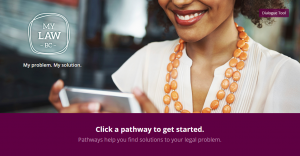MyLawBC helps you with common legal problems

By Nate Prosser
Online Outreach Coordinator
There’s no doubt that the law is complicated. What further complicates matters is when laws vary by jurisdiction (from province to province, and from country to country). This is why sites like Clicklaw are needed to help people find legal information. One of the biggest challenges faced by people who teach the public about the law is making legal information easy to understand and easy to act on.
The Legal Services Society’s new site, MyLawBC, takes a new tack to this challenge. The site is built around the idea of guided pathways — interactive pathways that ask you questions about your situation and then use your answers to create a plan that empowers you to solve your legal problem.
What can MyLawBC help me with?
For now, MyLawBC covers four main areas of law: divorce and separation, foreclosure, wills & estates, and personal planning.
If you’re going through a separation, MyLawBC can help. Its pathways guide you to the best way to work through separation with your spouse, to get a court order, or to respond to a court document. You may also use the Dialogue Tool which simplifies the process of creating a separation agreement by helping you and your spouse identify what’s important to you, giving you the platform and tools to work together to create a fair and lasting separation agreement.
For those facing foreclosure, there’s the missed mortgage payments pathway. As you progress through the pathway, MyLawBC gives you practical information on how to avoid foreclosure and where to find financial and legal help. Upon completion of the pathway, you are provided with an “action plan” which tells you what your options are to keep your house and what steps you need to take. Your plan also includes resources like tips, checklists, and sample letters.
The make a will pathway will help you learn about the decisions you need to make when writing a will. Depending on your situation, MyLawBC may provide you with a simple form to fill out to create your will. Even if MyLawBC cannot provide a will to fit your needs, the pathway will give you information about what to put in your will and how to get help to complete one.
Planning for your future where you may need help making decisions is also important. The plan for the future pathway explains the available legal documents and which one(s) are for you.


